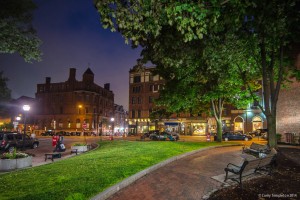September 2016
 By Benjamin Rybeck
By Benjamin Rybeck
If this,” Max says, “right now, were a film I’d made, know how I’d start?”
Kelly rolls her eyes at her brother and says, “How?”
“Godlike, the camera would begin overhead. And the spectator would watch Tommy’s Park for a moment, kind of like one watches the wide shots closely in films by John Ford and Sergio Leone and Michael Haneke. The spectator would watch, trying to figure out where his eye should fall—until, there! See? Someone has entered the frame. And with that, the camera would begin its descent, craning downward. You would float into the dream of the film.”
“Marvelous,” Kelly says. “I left my Oscar at home.”
Max laughs. “Who’d want an Oscar? You want to know what happened the last time I saw Evelyn?”
The way he packages these thoughts together, Kelly almost doesn’t notice his shift; instead, she watches one hippie across the park cough as he passes his joint to another hippie. But then, Max’s words hit her, and she looks up at him. “Yeah, what happened?”
“It was five years ago. December…”
By calling into a radio contest and answering correctly its trivia question (“In which Hitchcock film has a killer recently fled the police in Portland? It’s Shadow of a Doubt. A childish question…”), Max won a ticket to a screening of Land Without Water at the Portland Museum of Art. So that night, he crowded into the small screening room–smaller even than the theater at the Movies on Exchange, but cleaner–and he watched the Portland-set film for a second time, feeling his “attention slip like smooth wet glass” from his fingertips.
“Did you just think of that,” Kelly asks, “or have you been rehearsing?”
After the screening, he climbed over some long-legged people in his row. Max was the one destined to become the next great Portland filmmaker, and his work should’ve been on that screen instead. “I wasn’t bitter about it, though,” he says. “I just knew it. Like one knows a fact.”
Outside, he saw young people, lighting cigarettes, flicking collars skyward for shelter from the breeze. So with no collar to pop, and no cigarette to light, and no companion with whom to speak (he’s embellishing now, Kelly knows), Max started off home, going around the side of the museum to head south down High Street, looking upon Portland Harbor spread out before him, seeing all the lights and streets snaking together into ramshackle circuitry, lit up and electric.
As he hiked down High, he heard something up ahead and saw two silhouettes standing at the back museum entrance: a bulky man and a slim woman. He planned to pass without eye contact, but then the woman spoke. And what did she say? Please. Please. It was Evelyn. The back of his throat went dry, and he quickened his pace.
No entry this way. You need to go to the front and show your ticket.
I don’t have a ticket I told you.
Then no entry period.
Max’s feet felt like feathers as he glided on the ground, sighing her name, Evelyn, Evelyn. She and the man looked at Max, who sighed, sighed, It’s me, I’m here.
Closer, Max saw Evelyn clearly. Moisture glistened on her red-splotched cheeks, and she sniffed something back–something so thick it sounded clogged in her throat. Max came to a stop.
E
velyn stared at him and opened her mouth, startled. Her shoulders quaked, and it seemed like she was seeing how long she could hold her breath. Then, she looked Max in the eye and shook her head, and a fresh drip rolled down her cheek. She turned from both men and hurried across High, neglecting to check for oncoming traffic, then dove into a parking lot. The light held her for a moment, but Evelyn hustled into darkness, and Max lost her.
“This was not the response I’d desired,” Max says.
“Obviously,” Kelly says.
So Max called Evelyn’s name. Then, “across the street I flew,” he tells Kelly. “I ran into the darkened lot, but I’d completely and utterly lost her. This didn’t stop me. I ran, shouting into the darkness, shouting into trees, into bushes, shouting at houses lit dimly as though by candlelight. I shouted her name and ran around my city, until I was lost and confused in Portland for the first time. But still I called to her, Evelyn, Evelyn–” He stops, takes a breath. “So that was that.”
“Jesus.” Kelly shakes her head.
Max narrows his eyes. “That’s what happened.”
“Forget it,” Kelly says, “I was just thinking I might get a little honesty here–you know, something real–but I should have known it would be just another fucking performance.”
This is an excerpt from The Sadness, Benjamin Rybeck’s first novel. Rybeck is the marketing director at Brazos Bookstore in Houston, Texas. He holds an M.F.A. from the University of Arizona. His work has appeared in Kirkus Reviews, Electric Literature, The Rumpus, and Literary Hub, among others. He lives in Houston, TX.





0 Comments